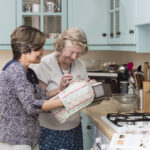Signs that live-in care is right for you to include unsteadiness and falls, disturbances during the night and near-miss accidents.
Dementia, disease and disability can all make it difficult to live safely at home. But how can you tell when your loved one needs live-in care?
There can come a time when it is no longer safe for an individual to live at home alone. The problem is, pride and shame, mean that loved ones may hide any problems they are facing.
The deterioration in function can also be gradual, so it can be difficult to know when extra care and support is needed. However, there are some key signs that live-in care may be necessary.
Danger signs
Even if your loved one assures you that all is well, you may be able to spot signs that they are at risk.
Burned food, charred pans, the sink or bath overflowing or the smoke alarm being triggered could all indicate that forgetfulness and confusion are becoming more of a problem.
Unsteadiness and falls
Age and illness can all increase the risk of trips and falls.
Falls can cause serious injuries but they can also knock your loved one’s confidence.
Falls can be more likely at night. There may be alterations that can be made to the home to make it safer, but if unsteadiness and mobility issues are a significant issue, it may be time to consider live-in care.
Disturbance of the sleep wake cycle
Dementia can affect the body’s natural sleep-wake cycle, so that people affected can be agitated and restless in the wee small hours.
When this happens, waking care overnight can ensure that they stay safe and well.
Kitchen crisis
We all need to eat well to nourish and fuel our bodies. But cooking and preparing food requires a number of complex skills.
Is the food out of date? Is the room clean, tidy and well maintained? Is there evidence of buying too much of some items because of forgetfulness?
The bottom line is, when you cook together do you have confidence that your loved one won’t injure themselves or forget to switch off appliances?
A quick look around the kitchen will tell you a lot about your loved one’s overall state of health and wellbeing.
Social isolation
Problems with communication, loss of confidence, poor mobility and memory problems can all lead people to avoid social contact and become isolated. This can have negative effects on physical and emotional health and wellbeing.
This sign alone, doesn’t indicate that live-in care is necessary, but it could form part of the overall picture.
Wandering
Anyone who suffers from memory problems and is able to walk unaided can be at risk of wandering. It can become a real problem in the later stages of Alzheimer’s disease. This can be stressful for the family and potentially dangerous for your loved one.
It can be exhausting and difficult to supervise twenty-four hours a day, so live-in care can provide expert assistance and reassurance that your loved one is safe.
Self-care sloppiness
How is your loved one managing with the usual activities of daily living? Ask yourself if they are clean and well presented, indicating that they are able to dress, wash and brush their hair.
If they are struggling with these skills, then a live-in carer could provide them with support, a helping hand and a gentle reminder to look after themselves.
Near misses
It may seem obvious, but little accidents can be a real indication that something more serious is on the cards.
So, if your loved one forgot to close the door at bed time or left the gas burner on for days, or forgot that they were running the bath, think of it as an early warning sign that they need a little extra care and support.
A need for respite
Family carers do a wonderful job, in often demanding and distressing circumstances. But everyone needs time to rest and recover. The stresses and strains of caring can affect your physical and mental health and your relationship with your loved one.
Live-in home carers can offer assistance day and night, allowing your loved one to stay healthy, happy and most importantly safe, in the comfort of their own home.
Find out more:






